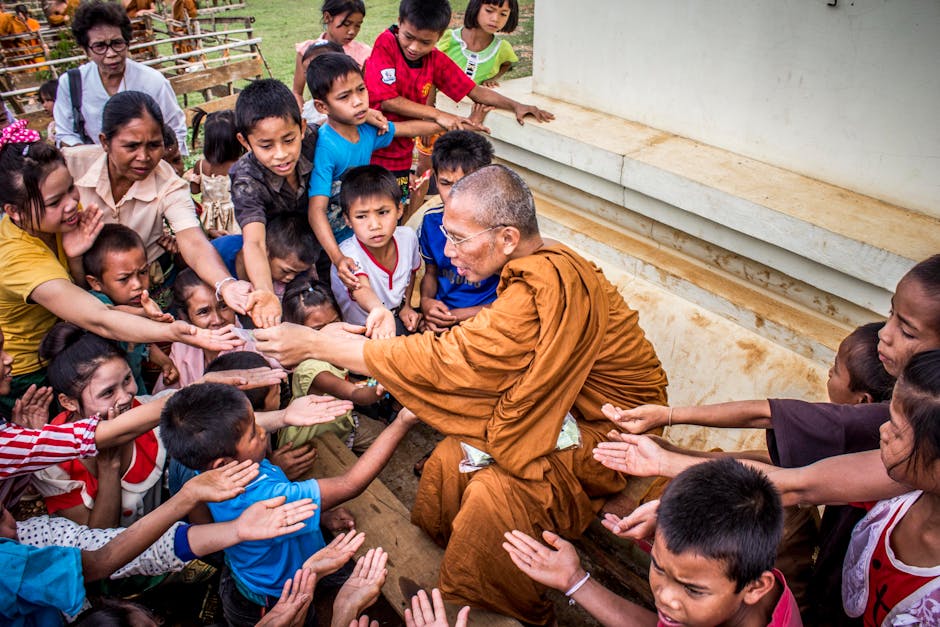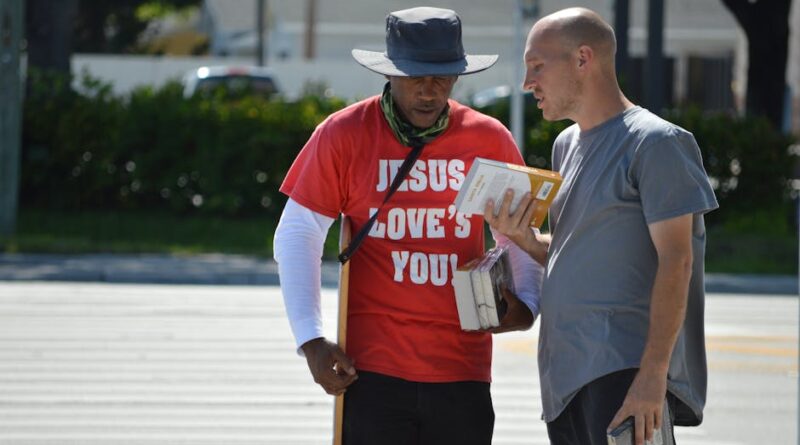The Impact of Community Outreach on Faith
Imagine a world where communities come together to uplift, support, and nurture one another through acts of kindness and compassion. In this world, faith serves as a guiding light, inspiring individuals to reach out beyond themselves and connect with others in meaningful ways. This is the essence of community outreach and its profound impact on faith.
Community outreach, at its core, is about extending a helping hand to those in need, fostering a sense of belonging, and building bridges across diverse groups. When coupled with faith, this outreach takes on a deeper significance, infusing acts of service with spiritual meaning and purpose.
In this article, we will explore the transformative power of community outreach on faith, delving into its various aspects, from historical perspectives to modern-day applications. We will examine how outreach initiatives have shaped religious communities, strengthened individual beliefs, and promoted unity and understanding among people of different faiths.
The Historical Roots of Community Outreach in Faith
Community outreach has long been intertwined with religious practices, dating back to ancient civilizations where temples and churches served as centers for social welfare and support. In early Christianity, for example, outreach to the poor and marginalized was a core tenet of faith, as followers were called to emulate the compassionate acts of Jesus Christ.
Throughout history, religious institutions have played a vital role in providing aid and assistance to those in need, from the establishment of hospitals and orphanages to the creation of charitable organizations and relief efforts. These initiatives not only served practical purposes but also served to embody the teachings of love, compassion, and service found in many faith traditions.
One notable example of the impact of community outreach on faith is the work of Mother Teresa, a Roman Catholic nun who dedicated her life to serving the poorest of the poor in India. Through her selfless acts of charity and compassion, Mother Teresa embodied the principles of her faith and inspired millions around the world to follow in her footsteps.
Modern Applications of Community Outreach in Faith Communities
Today, community outreach continues to be a cornerstone of many faith communities, serving as a means of expressing and living out deeply held beliefs. From food drives and homeless shelters to interfaith dialogues and social justice initiatives, religious organizations are actively engaged in serving their communities and promoting positive change.
One example of a modern-day outreach program is the Habitat for Humanity, a non-profit organization founded on Christian principles that seeks to eliminate poverty housing by building affordable homes for those in need. Through partnerships with local churches and volunteers, Habitat for Humanity has helped thousands of families achieve the dream of homeownership, all while fostering a sense of community and belonging.
Another example is the Sikh concept of “langar,” a community kitchen that serves free meals to all, regardless of background or beliefs. The practice of langar reflects the Sikh values of equality, service, and compassion, inviting individuals to come together in fellowship and solidarity.

By RDNE Stock project via Pexels
The Impact of Community Outreach on Individual Faith
For individuals, engaging in community outreach can have a profound impact on their faith and spiritual growth. By serving others, individuals are able to put their beliefs into action, embodying the values of compassion, generosity, and empathy that are central to many faith traditions.
Through acts of service, individuals often find a deeper sense of purpose and fulfillment, as they are able to make a tangible difference in the lives of others. This sense of contribution and connection can strengthen one’s faith and deepen their relationship with their spiritual beliefs.
Furthermore, community outreach provides opportunities for individuals to engage with people from different backgrounds and perspectives, fostering understanding, empathy, and unity. By working together towards a common goal, individuals are able to transcend differences and build bridges of mutual respect and cooperation.
Building Bridges Across Faith Communities through Outreach
One of the most powerful aspects of community outreach is its ability to bring people of different faiths together in a spirit of cooperation and collaboration. By working side by side on projects and initiatives that benefit the community, individuals are able to transcend religious divides and focus on shared values and goals.
Interfaith outreach initiatives, such as dialogues, service projects, and educational programs, have proven to be effective in promoting understanding, respect, and harmony among diverse religious communities. By engaging in meaningful conversations and joint activities, individuals are able to break down barriers, challenge stereotypes, and foster a spirit of unity and cooperation.
One such example is the Interfaith Youth Core, an organization that works to promote interfaith cooperation and understanding among young people from different religious backgrounds. Through initiatives such as service projects, leadership training, and dialogue sessions, the Interfaith Youth Core has successfully brought together thousands of young people to work towards a more peaceful and inclusive society.

By Suraphat Nuea-on via Pexels
Challenges and Controversies in Community Outreach and Faith
While community outreach has the potential to bring about positive change and foster unity among faith communities, it is not without its challenges and controversies. One of the main issues that can arise is the question of proselytization, or seeking to convert individuals to a particular faith through outreach efforts.
Some critics argue that certain outreach programs may use aid and assistance as a means to push a particular religious agenda, which can be seen as exploitative or disrespectful to the beliefs of those being served. Balancing the desire to share one’s faith with the need to respect the autonomy and dignity of others can be a difficult ethical dilemma for many faith-based organizations.
Additionally, some communities may be hesitant to engage in outreach efforts with those of different faiths due to fear, prejudice, or misunderstanding. Overcoming these barriers requires patience, empathy, and a willingness to engage in honest and open dialogue with others, even when differences of belief or practice arise.
Expert Opinions
According to Dr. Karen Armstrong, a renowned religious scholar and author, “Community outreach is an essential practice for individuals of faith, as it allows them to embody the principles of compassion and service found in their religious traditions. By reaching out to those in need and working towards the common good, individuals can deepen their spiritual connections and foster a sense of unity and solidarity.”
Dr. Eboo Patel, founder of the Interfaith Youth Core, believes that “Community outreach has the power to transform individuals and communities by bridging divides, fostering understanding, and promoting collaboration across religious lines. By engaging in acts of service and dialogue, individuals can build relationships based on shared values and mutual respect.”
Common Misconceptions About Community Outreach and Faith
One common misconception about community outreach is that it is solely the responsibility of religious organizations or individuals. In reality, outreach efforts can and should involve people from all walks of life, regardless of their faith or beliefs. By coming together to serve the common good, individuals can make a meaningful impact on their communities and build bridges of understanding and cooperation.
Another misconception is that community outreach is only about providing material aid or assistance to those in need. While this is an important aspect of outreach, it also involves building relationships, fostering understanding, and promoting social justice and equality. Outreach is about creating a more just and compassionate society for all, regardless of background or beliefs.
FAQs
Q: Can individuals of different faiths work together on community outreach projects?
A: Absolutely! Community outreach is about coming together to serve the common good, regardless of religious beliefs. By working side by side on projects and initiatives, individuals of different faiths can build relationships, foster understanding, and promote unity and cooperation.
Q: How can I get involved in community outreach efforts in my area?
A: There are many ways to get involved in community outreach, from volunteering at local shelters and food banks to participating in interfaith dialogues and service projects. Reach out to local religious organizations, non-profits, and community groups to find opportunities to serve and make a difference in your community.
To Wrap Things Up
Community outreach has the power to transform individuals, communities, and faith traditions by fostering understanding, unity, and compassion. By reaching out to those in need, engaging in interfaith dialogue, and working towards the common good, individuals can deepen their spiritual connections and build bridges of cooperation and respect.
As we continue to explore the impact of community outreach on faith, let us remember the words of Mahatma Gandhi, who said, “The best way to find yourself is to lose yourself in the service of others.” Through acts of service and compassion, we can discover the true essence of faith and humanity, creating a more just, inclusive, and harmonious world for all.




